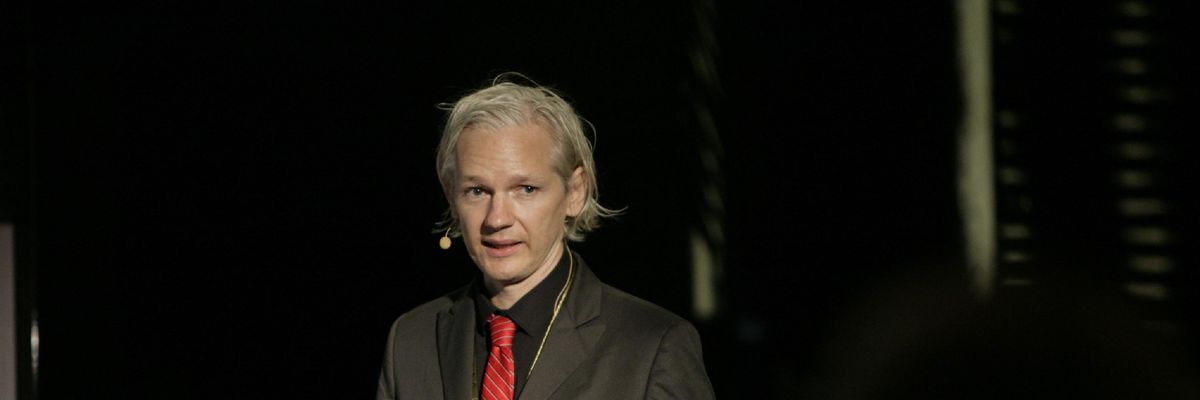The announcement by UK Home Secretary, Priti Patel, that WikiLeaks founder Julian Assange would be extradited to the US to face espionage charges may be news that many consider to be of lesser importance. We are, after all, in the midst of both a war inside of European borders and an economic crisis. The seemingly endless Assange saga has been going on for 12 years, and there is undoubtedly fatigue on the part of news consumers who have lost interest in the story.
The undermining of the free press is often the result of slow legal erosion rather than dramatic earthquakes.
But we should be interested, because this is about far more than Assange. And the stakes are very high.
The reaction from international journalism and free speech organizations to the decision by the UK government (which Assange will certainly appeal) has been close to uniform condemnation. Amnesty International issued a statement in which they stated, "allowing Julian Assange to be extradited to the US would put him at great risk and sends a chilling message to journalists the world over." Similarly, Pen International stated that, "invoking the Espionage Act for practices that include receiving and publishing classified information sends a dangerous signal to journalists and publishers worldwide."
Important to understand is the fact that charging Assange with espionage means that he is not able to put up what is called a "public interest defense." That is, Assange cannot argue that the release of material via WikiLeaks showing, for example, potential US war crimes in Iraq was in the public interest and thus justified. If successful, it's not hard to imagine how similar espionage charges could be used in the future against whistleblowers, journalists and news organizations.
As Trevor Timm of the Freedom of the Press Foundation wrote, journalists regularly engage in "receiving classified information, asking for sources for more information, and publishing certain types of classified information." Criminalizing these activities would have a profound effect on US (and international) reporting.
Yet, despite the implications of the Assange case for investigative journalism, there remains a distinct level of apathy on the part of not only the general public, but also--and more problematically--journalists. A large part of this undoubtedly has to do with what happened with both Assange and WikiLeaks after the 2010-11 release of material on Iraq and Afghanistan, leaked by whistleblower Chelsea Manning.
The rape allegations in Sweden against Assange, his seeking refuge in the Ecuadorian embassy in London and the increasingly erratic and occasionally irresponsible flow of information coming from Assange and WikiLeaks both eroded support and caused many to forget just how important and radical WikiLeaks had been during their early years.
This amnesia includes journalists and news organizations, with whom Assange always had a tense relationship. Yet, many of those journalists and news organizations would do well to remember the huge volume of stories written on the back of material obtained through WikiLeaks in 2010 and 2011. Material for which Assange now faces the possibility of life in prison for releasing, and for which Chelsea Manning has already spent time in prison, including solitary confinement.
And, to the question, "But, is Assange a journalist?" I would respond as I have in the past. Assange was a key part in the journalistic process, and by criminalizing his participation you thereby criminalize that process.
While we may think that the brutal Russian attack on Ukraine, current financial crisis, open undermining of democracy in the United States or upcoming elections here in Sweden are reasons to place less importance on the Assange/WikiLeaks story, they are actually reasons to place more attention.
The use of power--be it military, economic, political or social--demands monitoring through investigative reporting. Political and legal attacks that make such reporting more difficult, or even criminal, serve only the interests of the powerful the world over, be they in Moscow, Tokyo, Washington or Stockholm.
The undermining of the free press is often the result of slow legal erosion rather than dramatic earthquakes. And, let's not be naive about the symbolic importance of the US putting Assange on trial. It would be an alibi for cracking down on journalism for every repressive, authoritarian government in the world. And, let's not be self-righteous or ethno-centric. It would also be an alibi for cracking down on journalism in countries that consider themselves to be free and democratic, including here in Europe.
The Assange case still matters. A lot.



